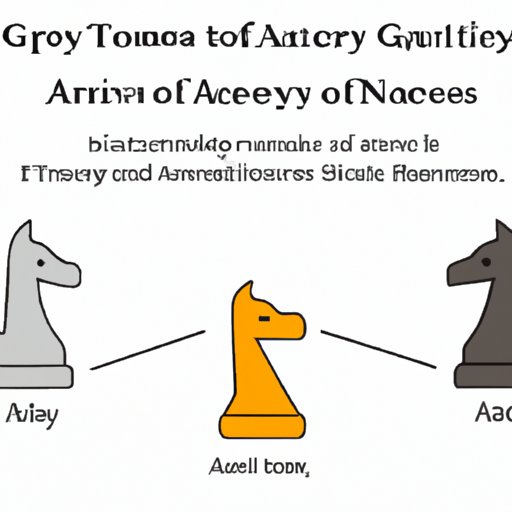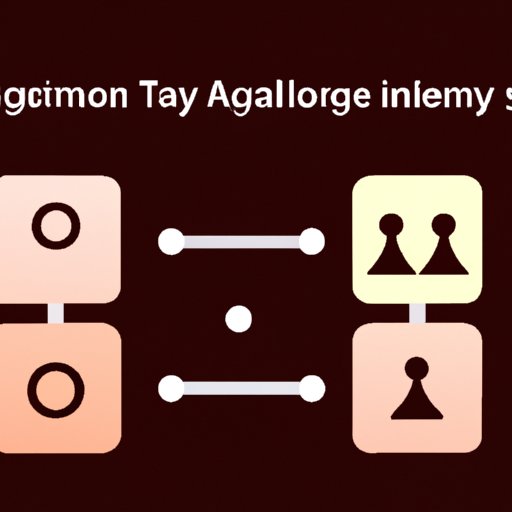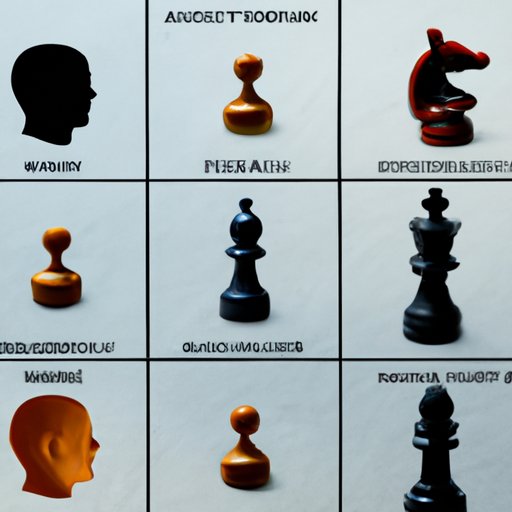Introduction
Game theory is a branch of mathematics that studies strategic decision-making in competitive environments. It has been used to analyze a wide range of situations, from economic markets to military conflicts. Recently, it has also been applied to the field of artificial intelligence (AI), helping to improve AI capabilities and decision-making.
In this article, we will explore what game theory is, how it is used in AI, and the potential benefits for AI development. We will also look at some of the key concepts of game theory, such as Nash equilibrium, and how they are used to create more intelligent AI systems.

Exploring the Basics of Game Theory in AI
Before exploring how game theory is used in AI, it is important to understand the basics of game theory. A game is defined as a situation between two or more players, where each player has a set of strategies available to them and their goal is to maximize their own benefit while minimizing the benefit of other players.
The most basic type of game is a zero-sum game, where one player’s gain is equal to another player’s loss. In such games, the goal of each player is to maximize their own gain while minimizing the other player’s gain. Other types of games include non-zero-sum games, where both players can benefit, and cooperative games, where players work together to achieve a common goal.
In each type of game, players can use a variety of strategies to maximize their benefit. These strategies can range from simple tactics, such as bluffing, to complex strategies based on game theory principles, such as the Nash equilibrium. The Nash equilibrium is a concept developed by Nobel Prize-winning economist John Nash, which states that a strategy is optimal when no player can improve their benefit by changing their strategy.

How Game Theory is Used in Artificial Intelligence
Game theory has been used to great effect in the field of artificial intelligence. By applying game theory principles to AI systems, developers can create agents that make better decisions in challenging situations. This is because game theory helps AI agents anticipate the actions of their opponents, allowing them to develop effective strategies for winning the game.
For example, game theory can be used to create AI agents that can play complex board games such as chess or go. By using game theory principles, these agents can anticipate the moves of their opponents and develop strategies to win the game. Similarly, game theory can be used to create AI agents that can compete with humans in video games, such as StarCraft or Dota 2.
Game theory can also be used to create AI agents that can solve real-world problems. For example, game theory has been used to create AI agents that can negotiate with humans in business settings. These agents can use game theory principles to anticipate the actions of their human counterparts and develop strategies to maximize their own benefit while minimizing the benefit of their opponents.
Understanding the Benefits of Game Theory in AI Development
Using game theory principles to create AI agents can have a number of benefits for AI development. By incorporating game theory into AI systems, developers can create agents that are more capable of making intelligent decisions in challenging situations.
For example, game theory can help AI agents become more efficient decision-makers. By anticipating the actions of their opponents, AI agents can develop strategies to maximize their own benefit while minimizing the benefit of their opponents. This can help make AI agents more efficient decision-makers, as they will be able to quickly identify the best course of action in any given situation.
Additionally, game theory can help AI agents become more sophisticated. By using game theory principles, AI agents can become more adept at predicting the behavior of their opponents and developing strategies to counter them. This can help AI agents become more intelligent and capable of handling more complex tasks.
Conclusion
Game theory is a powerful tool that can be used to improve artificial intelligence capabilities. By incorporating game theory principles into AI systems, developers can create agents that are more capable of making intelligent decisions in challenging situations. Additionally, game theory can help AI agents become more efficient decision-makers, as well as more sophisticated and adept at predicting the behavior of their opponents.
In conclusion, game theory is an invaluable tool for AI development, as it can help create more intelligent AI agents that are better equipped to handle complex tasks. As AI technology continues to advance, game theory is likely to remain an important part of AI development, helping to create more efficient and capable AI systems.
(Note: Is this article not meeting your expectations? Do you have knowledge or insights to share? Unlock new opportunities and expand your reach by joining our authors team. Click Registration to join us and share your expertise with our readers.)
